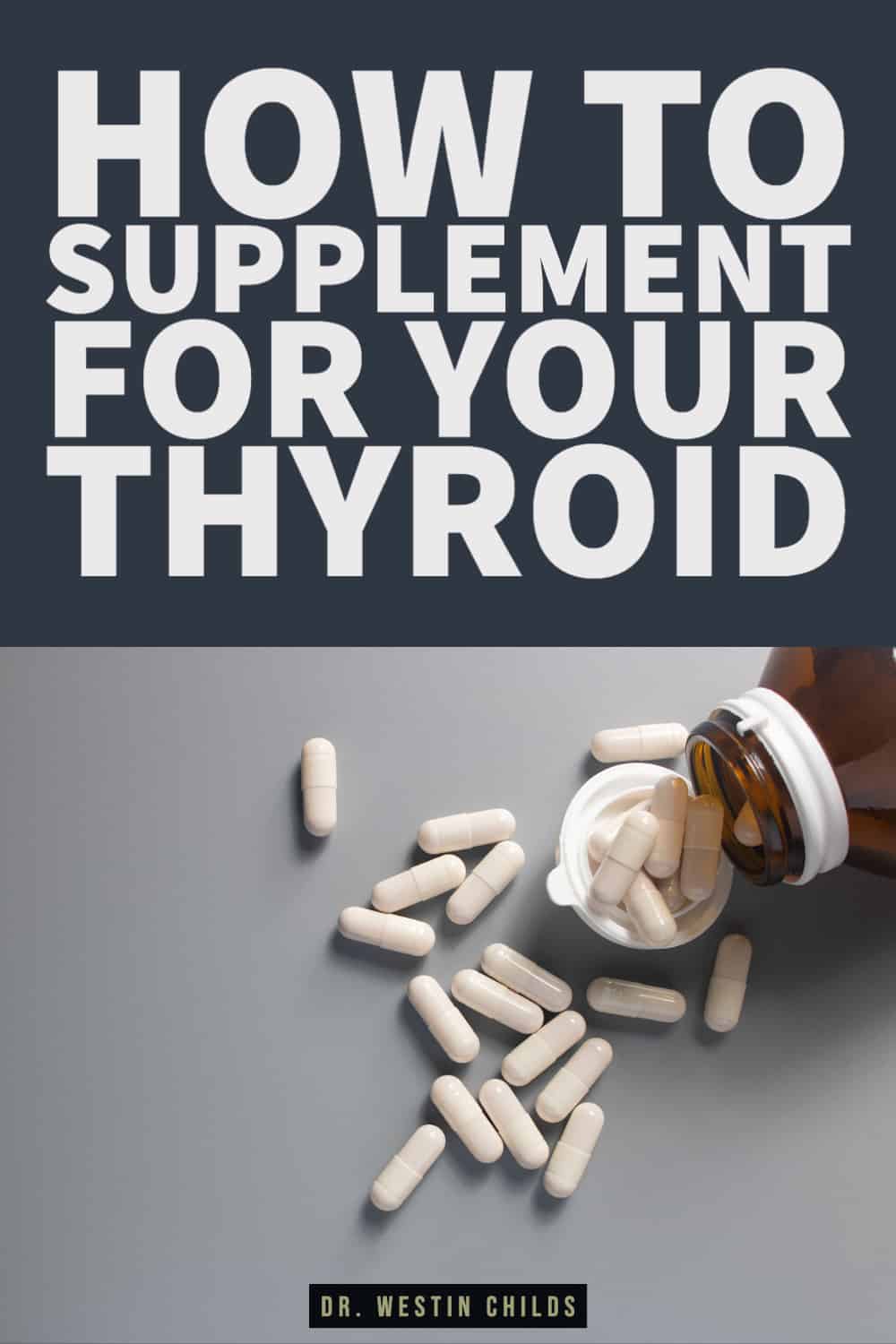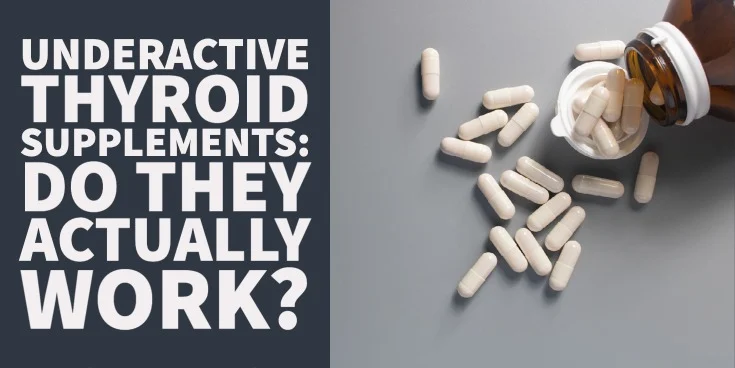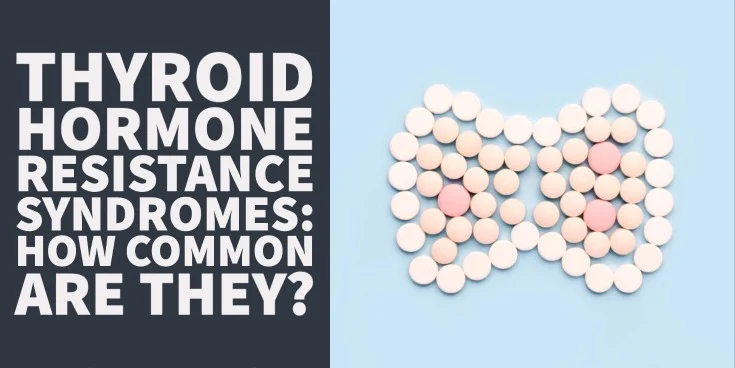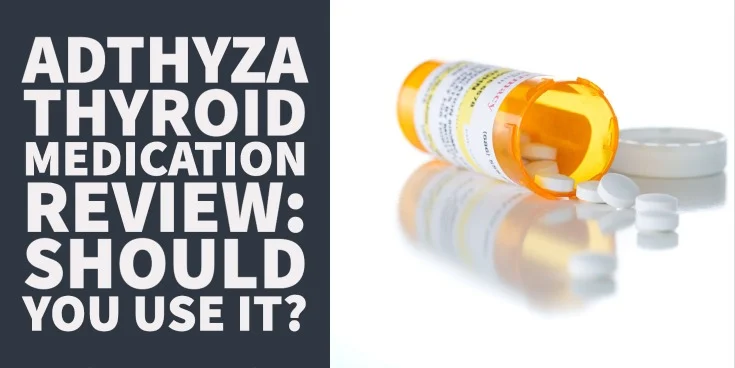Is it possible that using certain supplements can help improve the function of your thyroid?
Is it possible to enhance thyroid function and combine these supplements with your current thyroid medication? Is it safe?
This article is designed to help you understand whether or not you should use thyroid supplements, how they work (or if they work), how safe they are, and how to create a supplement plan structured for you.
Let’s Talk About Thyroid Supplements
Full disclosure: I personally have a number of thyroid supplements that I believe work well, but this article will not focus on my supplements and instead focus on information that I’ve learned after treating hundreds of patients and using supplements on over 80,000 patients.
With that out of the way, let’s talk about thyroid supplements!
With as many
And, if you are a thyroid patient, you probably already intimately know about the struggles that thyroid patients face.
Weight gain, fatigue, hair loss, constipation, cold hands/feet… these are just some of the symptoms that may persist if you have an underactive thyroid problem, even if you are using thyroid medication.
The flaws in the current thyroid treatment paradigm are not something I want to focus on today, but if you want to read more about my opinion on that topic you can here.
The goal today is to focus on what things you can potentially do (if any) to help improve the residual symptoms of hypothyroidism that can remain even after using thyroid medication.
To do that we need to talk about some of the basics of both thyroid function and supplementation in general.
First the thyroid:
For your thyroid to work optimally, the following steps need to occur:
- Hypothalamic sensitivity to changes in the bloodstream followed by the release of TRH (how much thyroid hormone is in your serum and is your hypothalamus sensing this?)
- Pituitary sensitivity to TRH and the production of TSH (the pituitary must be able to respond to TRH)
- Thyroid gland sensitivity to TSH and the production of T4 and T3 (conditions such as autoimmune disease or Hashimoto’s thyroiditis may limit your thyroid’s ability to respond to TSH)
- T4 conversion into T3 in peripheral tissues and in organs (inflammation, nutrient deficiencies, end-organ damage, and so on all limit this process)
- Cellular sensitivity to T3 (there must be a sufficient amount of free T3 compared to reverse T3)
It’s not important that you have a complete understanding of each of these but it is important that you understand that something can potentially go wrong at each stage.
In addition, certain vitamins and nutrients play an important role in ensuring that some of the stages occur.
For instance:
The conversion of T4 to T3 is reliant upon both Zinc (1) and Selenium levels.
Another example would be the fact that Iodine is required for thyroid hormone production in the thyroid gland.
A deficiency in any of these nutrients can negatively impact thyroid function at one or more of the stages listed above.
And this is how and why supplementing your thyroid can potentially help you feel better.
Now for supplementation in general:
Supplements such as probiotics, fish oil, CoQ10, Vitamin D, multivitamins, and so on are used by the vast majority of people (perhaps even you reading this).
The studies which show that supplements work tend to be somewhat conflicting with some studies showing positive results and others not showing any at all.
I think it’s better to look at supplements as a potential therapy that can work in some cases (but not all) and something that should be considered for most people.
If you look at supplementation as a way to ‘cure’ your disease state then you will most likely be disappointed.
But, on the other hand, if you look at supplementation as something that can potentially help you, then you are on the right track.
This logic extends to supplementing for your thyroid.
DOWNLOAD FREE RESOURCES
Foods to Avoid if you Have Thyroid Problems:
I’ve found that these 10 foods cause the most problems for thyroid patients. Learn which foods you should avoid if you have thyroid disease of any type.
The Complete List of Thyroid Lab tests:
The list includes optimal ranges, normal ranges, and the complete list of tests you need to diagnose and manage thyroid disease correctly!
Ways that Supplements Work
I don’t think it’s really well-known how supplements work or why certain supplements work and others don’t.
Much of the research into these compounds has to do with how the active ingredients in certain supplements interact inside your cells.
And this is great, but it doesn’t provide a reason why some supplements, even with the exact same ingredients, don’t work as well as others.
It’s considered common knowledge, for instance, that some underactive thyroid supplements simply work better than others (based on reviews and anecdotal experience).
But what accounts for these changes between supplements? Why do some supplements work very well while others don’t?
I think it has to do with 2 main reasons (which we will go over below).
In my mind, there are basically two main reasons why certain supplements function better than others.
If you pay close attention to the ingredient list of the supplements you are taking, you should be able to find how your supplement fits in here (or if it does at all).
#1. Using ‘Therapeutic’ Dosages
The first has to do with what I refer to as therapeutic dosages.
This idea stems from the same logic that doctors use when they prescribe medications.
Using medicine is helpful only if it reaches some critical thresh hold which then allows the medication to work.
This thresh hold is called the therapeutic range.
So how does this apply to thyroid supplements?
Supplements that follow this logic often have fewer ingredients but those ingredients are at therapeutic dosages.
So, for instance, zinc is known to play an important role in regulating thyroid conversion, supporting the immune system, and helping your thyroid function.

Knowing this bit of information, it may seem logical to use zinc if you have thyroid problems.
But how much should you be using? Should you base your dosing on the RDA or some other amount?
Will 5mg work as well as 30mg?
The answer is that most people tend to do better on higher doses and clinical studies do show results at higher doses (3).
It would, therefore, make sense to only include zinc at this therapeutic dose.
You’ll know if your supplement follows this method by looking at the ingredient list. There’s only so much of any one supplement that can fit in a small capsule, so you are limited to only 2-3 ingredients at higher doses per capsule.
The ingredient list may look something like this:
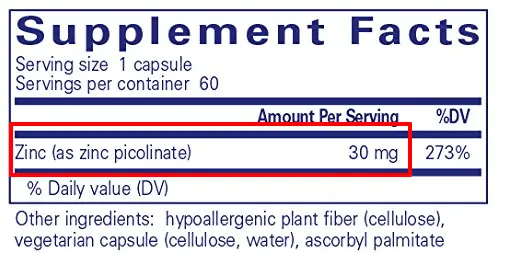
You’ll find this approach to be common among many physicians who tend to lean more toward the integrative side of medicine probably because this logic mimics that used in pharmaceutical preparations.
But this isn’t the only way that thyroid medications can work.
#2. Using Synergistic Combinations
The other option (and one that I lean more towards nowadays) is by using synergistic combinations of supplements to obtain the desired outcome.
What do I mean?
In this method, you would use combinations of lower doses of nutrients at specific ratios to one another, to obtain the desired results.
It is my belief that this method of supplementation is often superior to the ‘therapeutic dosage’ method because it tends to mimic what we find in nature.
Let’s consider this example:
When you eat an apple you are getting a certain amount of Vitamin C in each serving.
We can actually calculate that amount of Vitamin C and prepare a supplement that holds that amount.
But does taking that vitamin C mean that you are getting the same benefits as eating the apple?
No, not by a long shot.
Because in addition to vitamin C, you are also getting other vitamins, phytochemicals, pectin, fiber, etc.
Furthermore, the ratio of these vitamins differs between foods as well.
And all of these ingredients help contribute to the benefits that you gain when you eat these foods.
The idea behind using synergistic combinations of supplements is largely the same.
We want to give you specific amounts of nutrients to help with some desired outcome (in this case improving your thyroid).
You can imagine that this method of preparing supplements is much more difficult than just using the standard dosing, but when you get it right the results are very impressive.
Supplements that follow this method often have an ingredient list that looks like this:
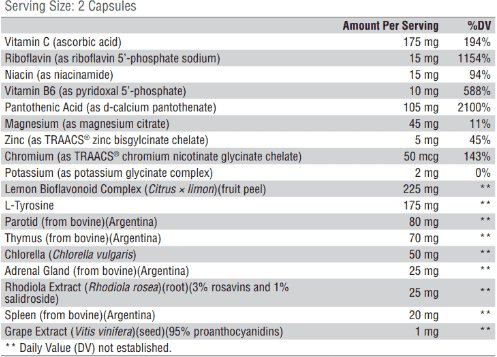
It’s not that one type is better than the other, in fact, both synergistic and therapeutic blends work for many people.
It’s just a good idea to have an understanding of HOW or WHY the supplements that you are taking are working.
Safety 101
It’s been suggested, and even shown, that some underactive thyroid supplements may be dangerous (4).
Because of this, some Doctors and institutions have recommended that you avoid ALL supplements which promote thyroid function.
But I don’t see them making the same recommendations for medications, even though medications have been shown to cause serious and dangerous side effects such as death.
Much of this probably stems from the bias that most physicians have concerning eastern/integrative therapies.
It’s important to understand that some low-quality supplements can potentially be harmful to your health, but that certainly doesn’t mean that all patients with thyroid issues should avoid all thyroid-related supplements.
It does mean, however, that you should take caution in how you use certain supplements and where you get them from!
So, are underactive thyroid supplements safe?
The answer is yes, for the vast majority of people taking them (around 99%) they will not experience any negative symptoms.
This figure may not be true if you purchase your supplements from overseas vendors or you get them from less reputable sources.
But, as long as you stick to well-known brands which manufacture their supplements in the United States you shouldn’t have to worry too much.
In most cases, underactive thyroid supplements either work or they don’t.
If they do work, you will almost always notice an improvement in your symptoms (meaning more energy, weight loss, hair growth, etc.).
If they don’t work, you probably won’t notice anything at all.
Rarely, but it does happen, you may start to feel worse.
This may manifest with symptoms such as feeling jittery, experiencing abdominal issues,
But, even the presence of these symptoms does not necessarily mean that you should stop taking your supplements.
Many therapies which are intended to help you get better may actually temporarily make you feel worse. This is true even of many prescription medications!
The fact that you are feeling somewhat worse may be a sign (a good sign) that changes are happening in your body for the better.
It’s difficult to know if the symptoms you are experiencing are good or bad, which is why you always want to use a knowledgeable physician or provider to help guide you through them.
Supplements May Negatively Impact Thyroid Medication
One thing you need to watch out for is the potential interaction between your thyroid medication (if you are taking it) and the supplements that you take.
Thyroid medication is a somewhat finicky medication in that it is difficult for your body to break down and absorb!
For this reason, you were probably instructed to take your medication on an empty stomach and to avoid eating, drinking, or taking supplements for hours afterward.
The reason for this has to do with the fact that eating, drinking (even coffee), and certain supplements can all bind to and inactivate your thyroid medication before your body absorbs it.
It’s certainly possible, if you aren’t following these rules, that much of your medication is simply excreted out of your body without ever making it into your blood!
This concern has led many physicians to simply recommend against the use of thyroid supplements because they don’t want to risk blocking thyroid hormone absorption.
When it comes to it, yes your thyroid medication is probably more important than your thyroid supplements but it’s certainly possible to have your cake and eat it too.
All you need to do is make sure that you do NOT take your thyroid supplements at the same time as your medication.
A good strategy might look something like this:
- Wake up and take your thyroid medication first thing in the morning – keep your medication and a glass of water right by your bed.
- Get ready for the day (shower, brush your teeth, put on makeup, etc.)
- 30-60 minutes later, you can then have breakfast
- Between breakfast/lunch is a safe time to take your supplements (preferably before noon) with or without a meal/snack
By following these steps you will ensure that you can effectively absorb BOTH your thyroid medication and your thyroid supplements. The best of both worlds.
How to Supplement for your Thyroid
If after reading this you want to give thyroid supplements a shot, how should you go about doing it?
My recommendation is to start with a methodical approach, one that takes into account all of what we’ve discussed thus far:
- Start with a solid multivitamin that contains a blend of vital minerals and nutrients – A good thyroid-specific multivitamin can provide you with an array of ingredients that your thyroid needs to function optimally. There are no fewer than 13 different vitamins and minerals required at baseline and you can get all of them in a thyroid-specific multivitamin like this one.
- Replace other nutrient deficiencies (Iron, B12, Vitamin D) – You can easily test for certain vitamins and nutrients in your blood. If you find that you are low then you should replete these nutrients. Hypothyroid patients, by virtue of how thyroid hormone works in your gut, tend to be deficient in both iron (5) and B12 due to absorption issues (6). Look specifically at these two!
- Then consider using more advanced and specific supplements such as those targeted to Adrenal health – Multivitamins contain vitamins and nutrients but don’t usually contain botanical ingredients. Botanical ingredients are plant compounds that are bio-active and that have specific effects when taken orally. Botanicals include adaptogens (which help adrenal function) and may help improve your energy and stress resiliency (7).
- Use thyroid supplements to target specific areas that you need improvement in (thyroid hormone production, peripheral thyroid conversion, inflammation, etc.) – If you’ve followed the steps above then there is a good chance you are probably feeling pretty good or have noticed at least some minor improvement. Once you take the steps above you can then go onto more advanced supplements directed specifically at your thyroid. These supplements are designed to help very specific functions such as boosting how well your body converts T4 into T3 and reducing roadblocks to conversion such as inflammation.
- Don’t be afraid to change up which supplements you use month-to-month!
One of the biggest mistakes that I see people make is that they don’t ever vary the supplements that they use.
This is a big mistake.
Why?
Because the needs of the body WILL change, especially as you address deficiencies and treat underlying problems.
For instance, in an ideal world, if you replace deficiencies such as iron and B12, you shouldn’t have to supplement with these daily for the rest of your life.
The body is actually quite good at maintaining levels of certain nutrients for long periods of time, even in the face of poor dietary habits.
In addition, other supplements such as probiotics may not need to be used daily (or for months on end). Bringing variety in both how much you take and how often you take it provides a needed change to the body.
It would be the equivalent of working the same group of muscles each and every day month after month.
It’s healthy and normal for you to vary your exercise routine, just like it’s healthy and normal to vary your supplementation.
This pattern of supplement taking also tracks well with what our ancestors would have been subjected to in the wild/wilderness.
Conclusion
Supplementing for an underactive thyroid is definitely something that all patients with hypothyroidism (known or suspected) should at least consider.
In many cases, you may experience an improvement in your symptoms.
Rarely, some people may experience negative symptoms, but this can largely be offset by purchasing vitamins from well-known brands and names.
The way that these supplements work has not been 100% established, but it’s plausible that they work by two primary mechanisms: the first is by providing your body with the nutrients that it needs, and the other is by providing your body with a synergistic blend of vitamins which positively impact cellular function.
Either method can potentially work, but it may take some experimentation on your part to figure out what your body needs!
Now I want to hear from you:
Have you found success in using supplements to enhance your thyroid?
If so, which supplements have worked for you?
Which haven’t?
Leave your comments below so you can help others!
